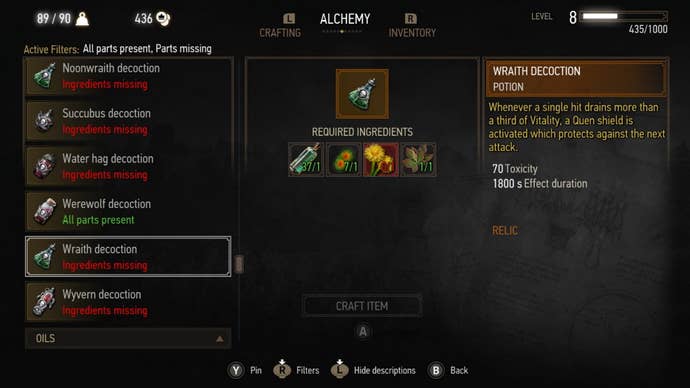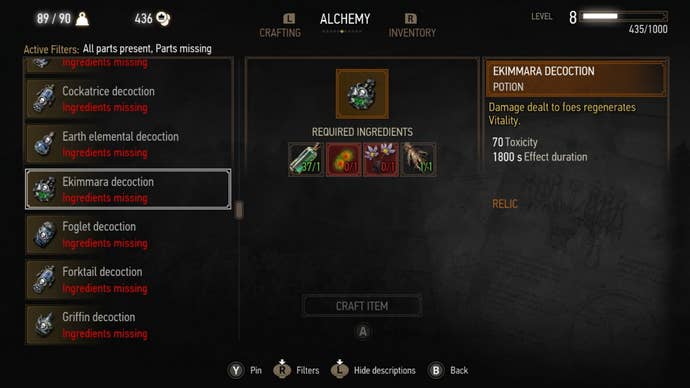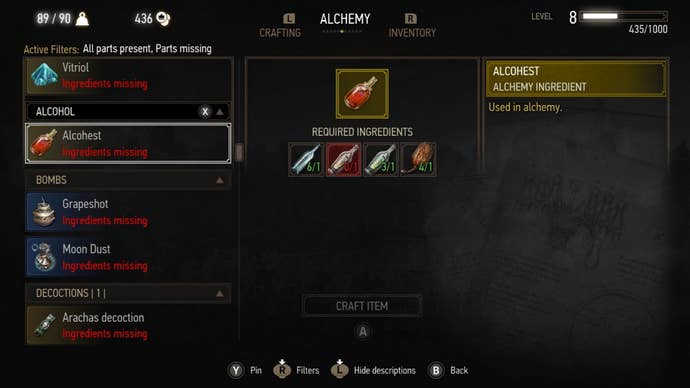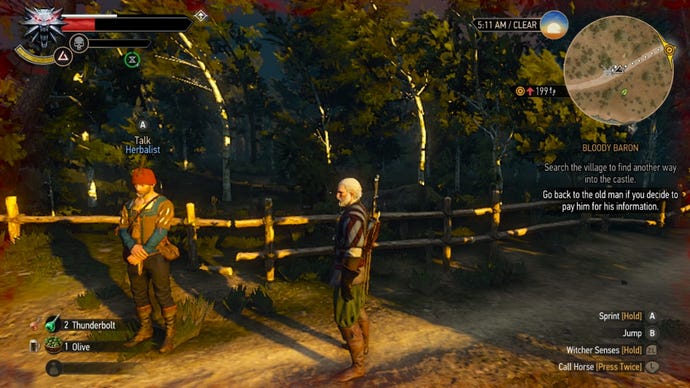The Witcher 3 Alchemy Guide: Best Potions and Decoctions
Crafty you!
The Witcher 3’s alchemy system is one of the RPG’s most important features and also one of the most baffling if you’re new to the world of Geralt.
Alchemy is essentially just the act of making potions, but with multiple varieties, random recipes, and so many choices to spend your hard-won ingredients on, it’s easy to get overwhelmed initially.
This guide explains how alchemy works, how to restore your potions, and which potions and decoctions you should try to keep on hand at all times in The Witcher 3.
The Witcher 3 alchemy and best potions

The Witcher 3 Alchemy and Potions explained
You can craft potions, oils, and decoctions from the main menu at any time in The Witcher 3, so you don’t need a herbalist or other specialist station to get started. The most important thing to keep in mind when crafting and deciding to use a potion is its toxicity effect.
Nearly every potion and decoction increases Geralt’s toxicity level, and if you max it out, he dies. Some potions – usually the stronger, more effective ones – have higher toxicity levels than others, so careful timing and using only what you need, when you need it is key to surviving The Witcher 3’s more difficult battles.
Oils, which you apply to weapons in a bid to exploit enemy weaknesses, don’t increase toxicity since Geralt doesn’t consume them (and there's no option to try, even if you wanted to).
It's also worth establishing that once you craft an alchemy or decoction recipe in The Witcher 3, you will then have access to a few of that potion, rather than needing to seek out all of the resources needed to craft it all over again. Your stock of that potion will reset whenever you meditate, but of course, you will still need to seek out recipes, collect the supplies and craft each potion at least once to have access to a supply of it.

The Witcher 3 Decoctions explained
Decoctions are crafted in the same way as potions, but they instead require a monster mutagen and usually offer some kind of strong offensive buff. The downside is that high-level mutagens needed for crafting high-grade decoctions are rare, and you often have a more difficult time finding decoction recipes.
As the strongest type of potion Geralt can get his hands on, the effects of decoctions last longer than your usual alchemy efforts. As a result, they'll also inflict Geralt with higher toxicity levels, so be very careful when using these.
How to get alchemy recipes in The Witcher 3
You can get new alchemy recipes in a few ways throughout The Witcher 3. One is buying them from herbalists, marked on the map with leaf icons, though their selections are often a bit skimpy. You can also learn recipes from reading books scattered around the world and in unlikely places. If you see one, make sure to read it – even if the only thing you get in return is a bit of lore.
A third method of finding new recipes is randomly obtaining them in chests you find around the map – in bandit camps, treasure spots, and other points of interest. Some recipes, such as the one for Albedo, are only found this way.
Empty chests reset after you level up, so you have a decent chance of finding most recipes before reaching the game’s middle portions. It just takes patience.

Alcohol and restoring potions
If you have strong alcohol on hand, you can replenish all your potions and decoctions by meditating. Strong alcohol refers to items such as Alcohest, Dwarven Spirit, and Temerian Rye, which you often need for crafting potions as well. It’s always worth keeping one or a few on hand so your potions don’t run out, but you don’t have to shell out for the finest alcohol. Cheap kinds like Alcohest work the same as the more expensive varieties.
Oils have an infinite number of uses, so you don’t have to worry about restoring them.

The Witcher 3 best potions and decoctions to craft early
While Geralt eventually gets access to a broad range of potions that you can, and should, experiment with, a handful are more useful than others. Even better, you get access to most of these early in the game as well.
Tawny Owl
Tawny Owl replenishes your stamina in combat, which means less time having to dodge and wait in between sword swings while Geralt catches his breath. You start the game with this recipe.
Thunderbolt
Thunderbolt is one of the best potions in The Witcher 3, if not the best, as it raises Geralt’s attack by 30 percent. It won’t augment your sign strength, but with Geralt packing that kind of power with each swing of the sword, that’s not really a problem.
Vesemir gives you this recipe before the griffin fight at the start of the game, so it’s impossible to miss.
Cat
You also start the game with this potion. Cat extends Geralt’s vision and lets him see in the dark, so there’s no need to bother with a torch in dark places if you’ve got one of these on hand. It's perfect in the Eternal Fire quest, where Geralt explores a dark mine to find his Netflix counterpart's armor.
Swallow
Swallow is another vital potion since it hastens the speed with which Geralt recovers vitality – Witcher 3 speak for HP. Use it during boss fights and other difficult battles to keep him hale and hearty.
Like the Tawny Owl potion, Geralt knows the recipe for Swallow from the beginning.
Ekimmara Decoction
The Ekimmara decoction is a bit trickier to make, since you need to encounter an Ekimmara and live to tell the tale, with an Ekimmara Mutagen as your prize. These usually wander the areas around Velen and Novigrad, though they deal heavy damage and move quickly.
The Ekimmara decoction restores vitality to Geralt when he deals damage to a foe, either directly with swords or indirectly through conditions such as bleed and fire. You can learn the recipe from the book My Evening With A Vampire, which you can find in the Crones’ house during the Orphans of Croockback Bog quest.
Water Hag Decoction
The Water Hag decoction works well in conjunction with vitality-restoring potions, as it boosts Geralt’s attack when his vitality is full. You can purchase the recipe from the herbalist in White Orchard, and you’ll need a Water Hag mutagen to make it.
Wraith Decoction
The Wraith decoction is a handy defensive brew that automatically generates a Quen shield if Geralt takes a hit that damages him for 30 percent or more of his total vitality. You can buy this from the same herbalist by the roadside shrine in White Orchard who sells the Water Hag recipe.
Fiend Decoction
The Fiend decoction increases Geralt’s max carry weight by 20 for 30 minutes, so if you plan on doing some looting or just need a bit more room in your pockets, this is the decoction for you.
You can buy the recipe from the herbalist on Kvalheim Isle in Skellige, or you might get lucky and find it earlier as a piece of random loot.
White Honey
White Honey cleanses Geralt of all toxicity, making it a vital potion to have on hand if you plan on using brews and decoctions during your adventure – which you should. It requires few ingredients, and Geralt starts the game with the recipe in hand.
Blizzard Decoction
The Blizzard decoction is one of The Witcher 3's best decoctions, as it allows you to slowdown your reaction and reflexes time. If you find yourself struggling during a fight or being overwhelmed by enemies, using this to perfect your parries and dodges can make things significantly easier.
You'll be able to learn this recipe using The Book of the Swallow, which will be given to you by Triss during the game's prologue.
Whether you're just starting The Witcher 3 for the first time or need a refresh after a long time out of the saddle, check out our Witcher 3 walkthrough for all the essential info, including how to get the best ending and which quests you should actually do in the wide, open world.









